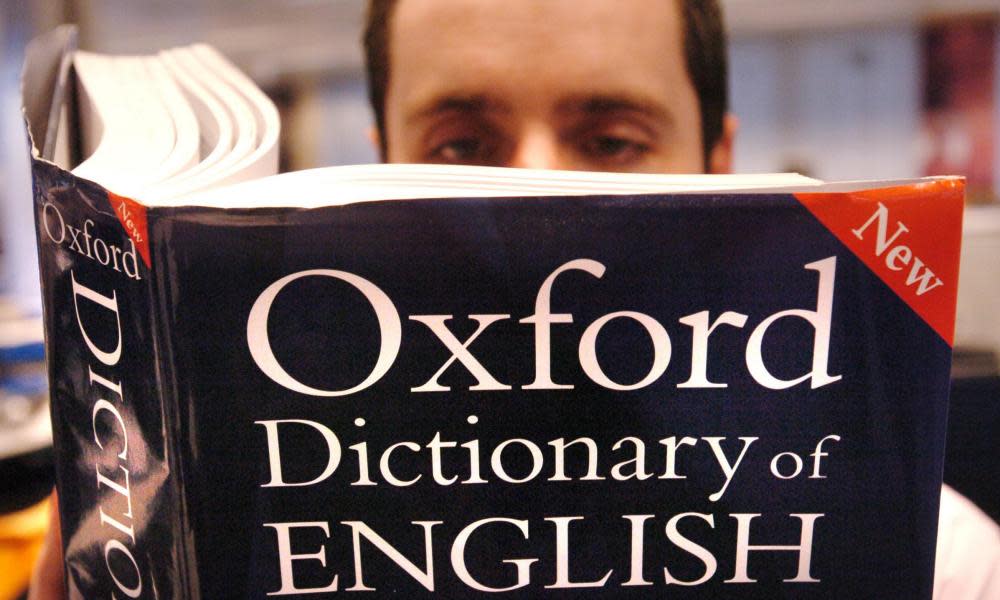OED's new words include 'mansplaining' but steer clear of 'poomageddon'

From “poonami” to “shitastrophy”, the venerable editors of the Oxford English Dictionary found themselves deluged with words relating to the explosive contents of nappies when they turned to parenting forum Mumsnet to ask which words and phrases should be considered for inclusion in their latest update.
Because many of the terms that form part of the everyday vocabulary of parenting are relatively recent coinages, according to the dictionary, the OED has not included them in earlier editions. But feeling that the “newer arrivals reflect not only medical advances, but also developments in how we think about children and view their place in our society”, its lexicographers were “keen to capture the imprint of these changes and developments on the English language”.
The dictionary generally consults experts from different fields when it adds new specialist terms, but when it came to parenting vocabulary, it asked the online forum Mumsnet for help. It received almost 200 suggestions from users, of which 47 are among the latest additions.
The new words reflect the challenges and joys of trying to become, and being, a parent. Some are opaque to those who have not entered this world, from “TTC” (“trying to conceive”) to “BFN” (“big fat negative” – used “mostly online to report or talk about the results of a pregnancy test”) and Aunt Flo (“A punning euphemism for the menstrual period”). Some reveal the different approaches to parenting that are picked over regularly by Mumsnet users, from “CIO” (“cry-it-out, a method of sleep-training”) to “AP” (“attachment parenting”, which aims to “promote a close relationship between a child and its parents, esp. as initiated in infancy by practices such as feeding on demand, late weaning, and letting the baby sleep in its parents’ bed”) and SAHM (“stay-at-home-mum, a mother who does not go out to work”).
“Baby-led weaning”, “helicopter parenting” and “babymoon” all make it into the latest update, but despite the plethora of suggestions for what OED senior editor Fi Mooring described as “the poo(p) words” – in particular poonami, which was put forward by 16 Mumsnet users – they failed to make the cut.
“Our Mumsnet respondents had no fewer than 13 different suggestions for words describing an explosion of infant faeces of epic proportions,” said Mooring. “This is testimony, perhaps, to the daily reality for any parent of babies or small children – that the fearful devastation [wrought] by an infant’s bowels requires not just a cast-iron stomach but also a formidable sense of humour.”
From “poomageddon” to “apoocalypse” and “poopcasso”, Mooring said that “whilst, individually, none of these terms yet make the grade as far as OED’s inclusion policy goes, together they form a noteworthy lexical set – remarkable not only for its relative size but also because the words in it are unusually similar in formation”.
“More than half of the suggestions we received of this type are formed as blends, usually created by combining a colloquial term for faeces with part of a word denoting some kind of disaster of monumental proportions,” she said. “This isn’t the end of the story for this fertile set of words. They’re on our tracking list and we’ll be watching to see how they develop over the next months and years.”
The OED features more than 829,000 words, laying out their meaning, history and pronunciation. In order for a word to make it into the august reference work, which published its first edition in 1884, there must be evidence that it has been used “for a reasonable amount of time”, along with several independent examples of its usage. “We also like to see it used unselfconsciously, without an explanation of what it means,” said associate editor Eleanor Maier.
More than 1,100 new words were included in the latest update to the online edition of the dictionary, with more than 100 of them relating to parenting. The last print edition of the OED – its second edition - was published in 1989, with a third edition unlikely to make it into print.
“Mansplain” also enters the dictionary for the first time. According to the OED, just 10 years ago the word did not exist, “but the verb (of a man: to explain something needlessly, overbearingly, or condescendingly, especially to a woman, in a manner thought to reveal a patronising or chauvinistic attitude) and the concept it describes now have a firm foothold in the language”.
The earliest known use of mansplain occurs in a pair of comments on the social networking website LiveJournal in August 2008, said the dictionary. The exchange sees a woman “thanking” a male blog commentator for “mansplaining” to her, and he responds asking if it was really “mansplaining”. The term is often misattributed to writer Rebecca Solnit and her book Men Explain Things to Me, though she never used the term in the eponymous essay.
“If those really are the first occurrences of the verb mansplain or the noun mansplaining (in quick succession), then this is a rare example of seeing linguistic creativity in action, and perhaps an insight into what can drive such innovation,” said the dictionary.
“We’re not saying it wasn’t used earlier. If anyone can find an earlier usage, then great,” said Maier. “Solnit wrote Men Explain Things to Me in 2008, so the concept was already around.”
Other additions include “snowflake”, a now-derogatory term that was defined in 1983 as a person “having a unique personality and potential”, but has now come to be “used as an insulting term for a person characterised as overly sensitive or as feeling entitled to special treatment or consideration”. “Hangry”, meaning “bad-tempered or irritable as a result of hunger”, “me time” and “deglobalisation” have also been included.


